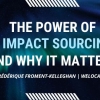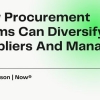Having a diverse workforce results in increased ROI for companies; but this isn’t breaking news. Companies in the top quartile for gender, racial and ethnic diversity are “more likely to have financial returns above their national industry medians,” according to a McKinsey & Company report. At the board of director level, they also found ethnically and culturally diverse companies were 43% more likely to see above-average profits, showing a significant correlation between diversity and performance. Another study found that innovation was six times higher for companies that report greater gender equality compared with those that did not.
Diversity is a topic that should be on every company’s radar, not only for the financial benefits -- which come from a well-rounded talent pool, better culture, global enablement and resource development -- but because a diverse workforce offers organizations unique perspectives. That, above all else, will give any company a leg up on their competition.
If you’re an executive, you may be reading this thinking, We have a diversity and inclusion program for our full-time employees and we partner with a diversity supplier for our contingent labor needs, so we’re covered. The truth is, you (and your employees) are likely not profiting the way you potentially could be.
Contingent Workforce Growth
Organizations tend to focus only on their full-time workforce when considering a diversity strategy, but leaders often forget the importance (and size) of their contingent workforce. An estimated 40% of the workforce ( approximately 57 million people) will comprise contingent workers. This number will likely grow higher as automation and digitization force companies to reskill or replace current full-time staff and rely on specialized skillsets of contingent talent." Globally, nearly half (45%) of employers are experiencing difficulty filling full-time positions.
In the past, companies have looked to diversity-certified suppliers to fulfill company-wide diversity initiatives. They bring corporate responsibility, sustainability and ensure regulatory requirements are met – all critical components to any diversity strategy. However, that doesn’t guarantee companies will be provided – and then benefit from – diverse talent.
If companies truly want the benefit achieved from a diverse workforce, they must consider whether they are doing what it takes to attract that talent in every single area of their business, including contingent labor.
Having a solid supplier diversity strategy coupled with the ability to tap into a diverse talent pool will provide companies with the social responsibility and innovation necessary to compete for talent, with their competition and in the global market as a whole.
There are many nuances and considerations to putting a diversity strategy into place for contingent labor. Stay tuned for the next part of our series, “How Companies Can Increase Diversity Amongst Their Contingent Labor,” to learn about approaches some companies are taking to benefit from total workforce diversity and inclusion programs.










